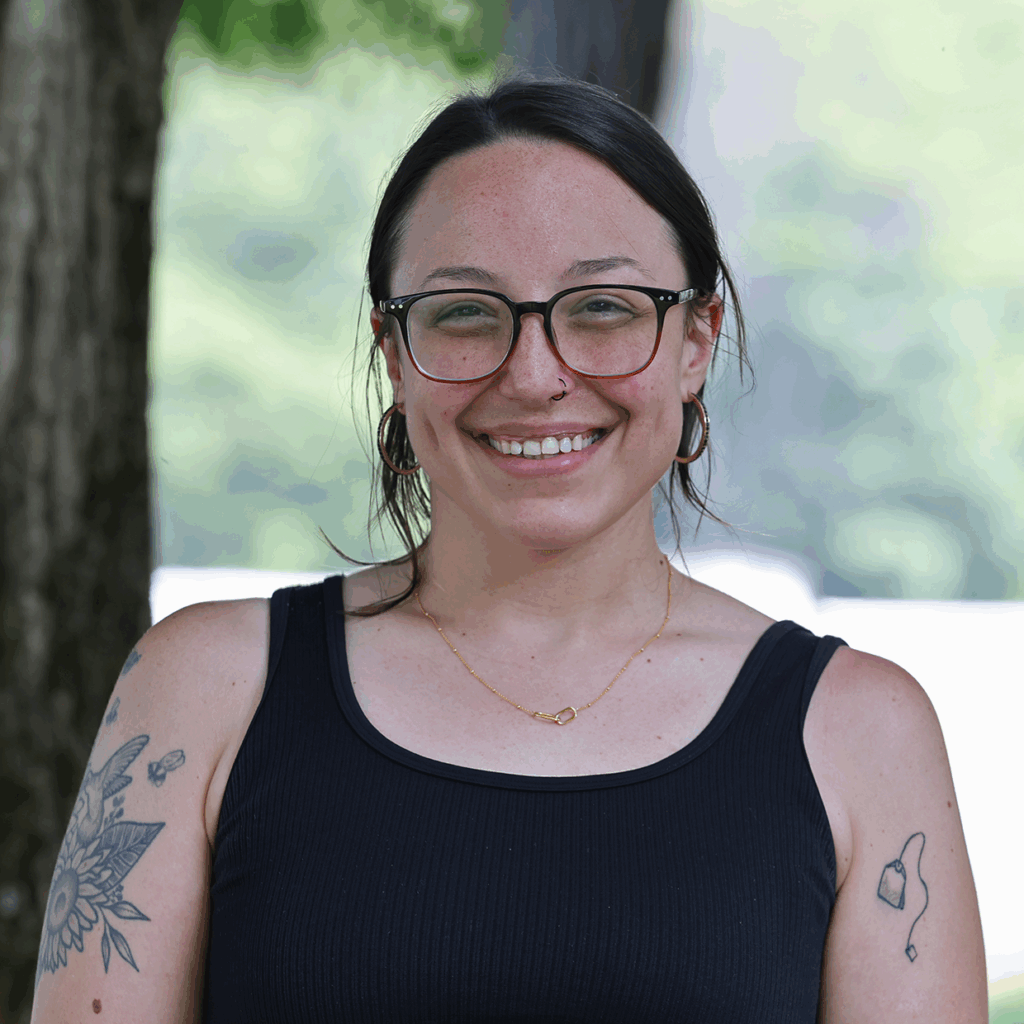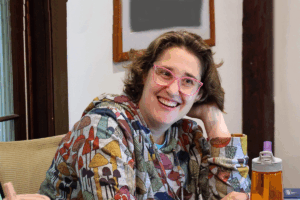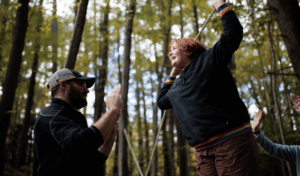Mental Health Matters
If you’ve been at Mountain Valley sometime over the last eight years, there’s a good chance you know Ashley Metz. As one of the longest-tenured employees with the company, Ashley is passionate about mental health and has her own inspiring story to back it up. After she felt her life crashing down during college, Ashley sought help, finished her degree, and ended up completing a master’s degree to become a licensed clinical mental health counselor. Ashley started working as a residential counselor and also served as residential supervisor and director before moving into her current clinician position two years ago. She credits Mountain Valley for helping guide her through her own healing journey—and she’s helped heal countless others along the way.

Tell us a bit about your background?
I was born and raised in Western Massachusetts and went to college in Worcester. I was quite lost, and it took me six years to graduate with my bachelor’s degree. I ended up taking some time off for my own mental health.
My family—my mom especially—experienced trauma when I was growing up. In high school I was more depressed and coping with substances. I was smart and a good kid, so I scraped through, but when I went to college it all hit me. The anxiety was much more prevalent than I realized, and I was having panic attacks in class for the first time. I also have ADHD, but I wasn’t diagnosed until later in life.
I had a lot of anxiety around this need to perform—my mom always wanted us to do better. My sister and I have, and we’re very proud of that. But I struggle with this fear of failure every day, to be honest, and undergrad is where it all came crashing down. I was smoking and drinking a lot, and I wasn’t secure in myself. I got my validation from others. When I wasn’t getting validation I turned to extreme behaviors, and finally ended up being hospitalized for about two weeks.
That was a wake-up call. I moved in with some friends after that and they supported me through the next steps in a rehab program. I got to this point of “What am I doing with my life?” and met my husband Charles right after that. He helped save my life and he provided the secure attachment that I really needed.
How did you end up at Mountain Valley?
Charles got a job coaching soccer at Colby-Sawyer College. We had bartended together, but when we moved up to New Hampshire, I thought maybe I should try to be an adult. I stumbled on Mountain Valley and even though it was a long drive from our place, I was really intrigued.
I had done therapy myself at different levels and I decided to shadow there to see if it was a good fit. I was expecting very ill kids—instead I see these shy, nervous kids who are afraid to step outside. It was not what I was expecting. Then I saw my first graduation and thought “this is really cool.” I was so outside of my comfort zone. I started working at the old campus as a residential staff member, and now I’m here eight years later.
What has your growth process been like?
It’s such an interesting dynamic being on residential staff. It’s almost like an older sibling, in a lot of ways. Especially because when I first started, my younger sister was the age of the kids I was working with. I started to get to know the clinicians better and when we moved to the new campus in Plainfield, we were a tightly knit group.
The longer I worked at Mountain Valley, the more I realized that the clinicians were really cool people. I’d had this stereotype of what mental health professionals were like and they weren’t like that at all. They were people I wanted to hang out with. I decided to go back to school so I could become a clinician, but I was scared because of my experience in undergrad. Mountain Valley offered to help pay for some of it, which really impressed me.
When I started my graduate program, I found I actually liked my classes, and it made a world of difference. It’s a miracle I graduated from college, and then I got a 3.9 GPA in grad school—I was so proud. I think it also shows how important your mental health is when you’re doing these really big things.
I tell a lot of the kids I work with my story, “Dude, it took me six years to graduate because I needed to stabilize and get my feet under me.” My GPA shifted so dramatically because I was in a place where I wanted to be in school. I felt confident in school and secure in myself. I’d like to think Mountain Valley helped heal me.
Why do you think Exposure and Response Prevention (ERP) works?
I think it seems counterintuitive, like why would I do the things are the most triggering to me? But I love it because it’s applicable to literally anyone. Every single person on campus can do an exposure, all day, every day. I love that we as clinicians can model it in the moment with our kids.
For example, I love to travel but with all the media around plane problems, I started having panic attacks about flying. The exposure would be for me to fly anyway and sit with the discomfort that shows up. I brought that experience into work and into group, and shared it with my kids. There are real life examples all the time.
When it comes to severe anxiety and OCD, it’s really difficult. We’re asking them to face their biggest fears, things that I probably wouldn’t have done at their age. It’s so cool to see them face it and build that courage—it surprises me every time and they surprise themselves every time. More importantly, we debrief and reflect on the experience. That piece is so important, because what comes out on the other side is confidence and security.
What’s one of your favorite success stories as a clinician?
We had a recent resident who was really sick. She was so isolated and afraid of the world that she didn’t leave her bedroom for long periods of time. The only time she would leave for over a year was to go to the pet store to buy cat food. Getting her to Mountain Valley was a long road—it took years. She had become very paranoid and thought everyone was out to get her, including her parents. There was a lot of mistrust and she thought we were a cult, that we were brainwashing her.
I like to think one of my top skills as a therapist is building rapport, so I can usually connect with kids pretty quickly. But not this one—she gave me a run for my money. She finally bought in and went from saying that she didn’t want any friends and wanted to live alone, to becoming the most popular girl on campus. It was her first time having friends, really.
When she left Mountain Valley she was proud of her experience. Now she has a part-time job, she’s starting her senior year, and she just got her learner’s permit. It’s so special watching such special kids learn to love life again.
What are your future goals?
Before I became a clinician at Mountain Valley, I worked a residential supervisor and I loved the mentoring part of the job. It felt like therapy a lot of the time. I was program director for a little bit, then I moved to the clinical team. I’ve had all these different roles and being a therapist is my favorite, but I miss that mentoring piece.
I can see myself serving as a supervisor for unlicensed clinicians or even licensed clinicians. If I ever leave Mountain Valley, I hope to create the kind of community and support that exists here, because not a lot of therapists get that. I love teenagers a lot, but I could see myself shifting to serve more of a college-age population. That’s when I needed help the most, so I want to use my experience to make a difference.


